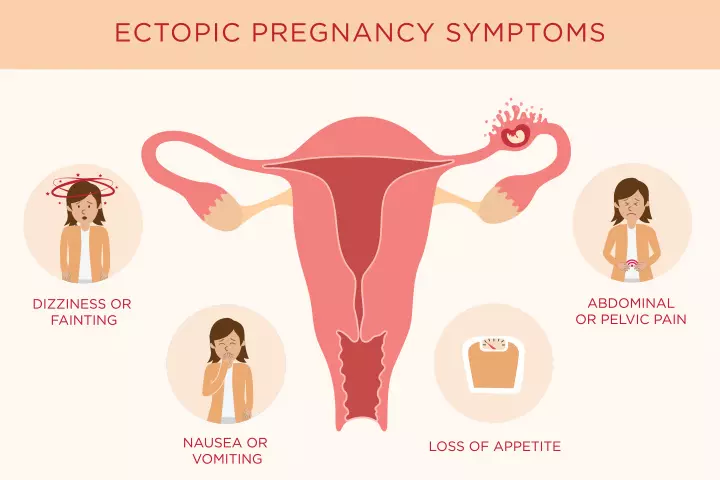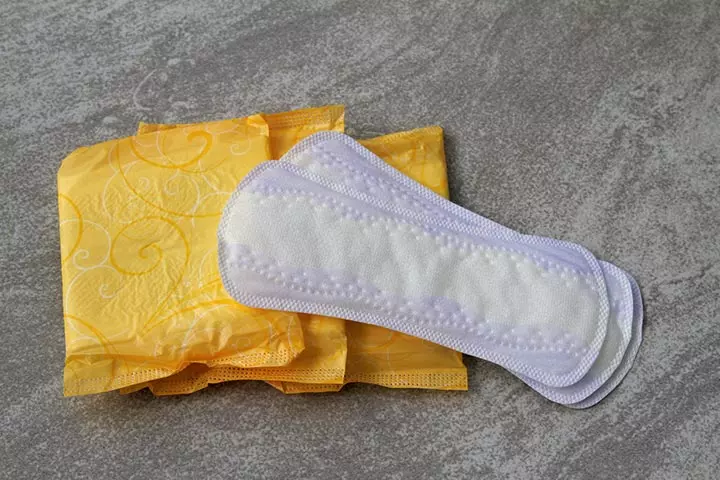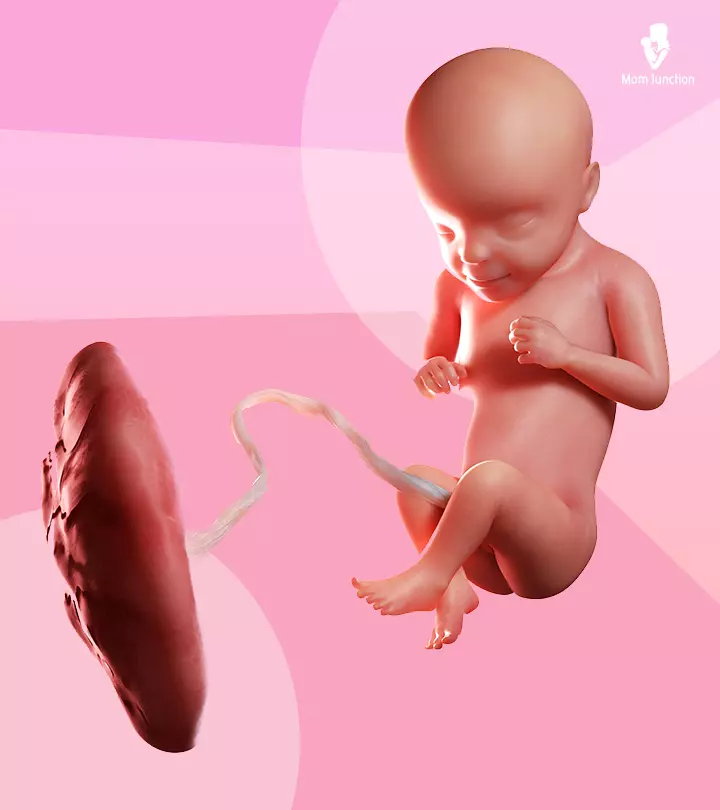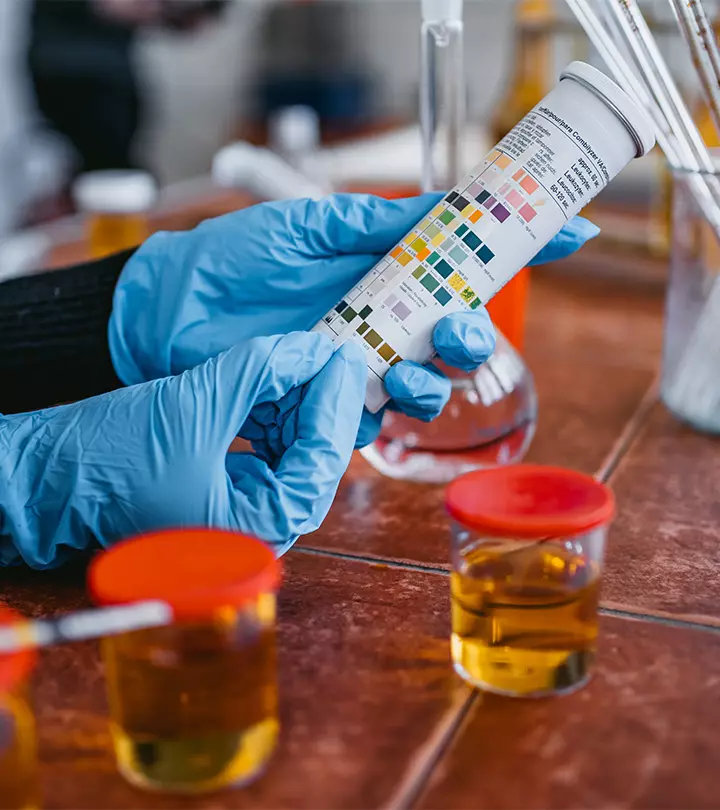
Image: ShutterStock

Vaginal discharge during pregnancy can be due to various reasons ranging from normal hormonal changes to underlying conditions. Leukorrhea or thin, milky, white vaginal discharge is one of the initial pregnancy symptoms. Sometimes you may notice color changes in vaginal secretions such as yellow or yellowish-green discharge. It is recommended to consult a doctor if you notice color changes in vaginal discharge or experience symptoms such as unpleasant odor or itchiness along with the discharge (1) (2). Read on to know the causes of vaginal discharge in pregnancy and whether you need a doctor’s consultation to know how to treat it.
Key Pointers
- Vaginal discharge is normal during pregnancy and is usually thin and milky white.
- Medical attention is necessary when there are changes in the discharge color like yellow, green, or pink indicating underlying conditions.
- During the due date, thick mucus and blood streaks, called “the show,” may be present in the discharge.
- Panty liners or pads are recommended to manage discharge during pregnancy, but tampons should be avoided.
- Itching, burning, swelling, or redness are warning signs, and your doctor should be contacted immediately.
Different Types Of Vaginal Discharge During Pregnancy
When you are pregnant, you will notice an increase in your vaginal discharge, something you may have always experienced but haven’t noticed until now. Before you panic, understand that vaginal discharge is a part of pregnancy and is quite normal.
You may also notice an increase in pregnancy-related vaginal discharge in the third trimester, especially as you near the due date. When you are nearing birth, vaginal discharge may contain streaks of thick mucus and some blood, known as a show, and this can begin a few days before labor (3).
Here are some of the different types of vaginal discharge that you may experience while you are pregnant:
1. Yellow vaginal discharge

Here are a few reasons why you may notice a yellow-colored discharge from your vagina while you are pregnant (4):
- Yellow discharge from your vagina, especially while you are pregnant, could be a sign of an infection (2).
- The neutrophilsiA type of white blood cell that helps fight bacteria, viruses, fungi, and inflammation , a type of white blood cells, are present near your vaginal area and can result in the yellowish color that you may see in your pregnancy-related vaginal discharge.
- Once your infection turns severe, the yellowish tint from the vaginal discharge may turn into a yellowish-greenish discharge, and then to an outright green vaginal discharge.
- Sometimes, you may notice a yellowish discharge on your underwear after you have taken it off. This could be the vaginal discharge, which is usually white, has turned yellow after coming into contact with air, and become dry.
- The yellow discharge during pregnancy could also be due to an infection known as bacterial vaginosis. It is also referred to as vaginal bacteriosis and is one of the most common infections in the vaginal area in women who are of fertile age. According to the National Health and Nutrition Examination Survey (NHANES), nearly one-third (29%) of women tested positive for bacterial vaginosis on self-collected vaginal swabs (17). While the condition mostly develops after having sexual relations, it is not categorized as a sexually transmitted infectioniA bacterial, viral, or parasitic infection that is passed from person to person through sexual contact or STI (5).
 Research finds
Research finds2. Green vaginal discharge
Here are a few reasons you may notice a green discharge during pregnancy (4):
- Seeing a green vaginal discharge during your pregnancy could be a little daunting, and it is something you should also be careful about. If you do notice a green color in your vaginal discharge while you are pregnant, make sure you speak to your doctor about it immediately. The green color is often an indicator of an infection (2).
- If you see a greenish vaginal discharge while you are pregnant, take a look and see if the green color is present throughout the discharge or if it is only in a few spots.
- When you have any vaginal infection or an infection that may be present near your vaginal area, the neutrophilsiA type of white blood cell that are produced in the bone marrow and helps the body fight infection start multiplying. During an infection, these white blood cells become extremely active. As some of the neutrophils start to die, they break up into smaller pieces and give off a green-colored pigment that is also known as verdoperoxidase. It is this pigment that makes your pregnancy-related vaginal discharge look greenish (6).
- If you notice a strong, foul smell that accompanies your green vaginal discharge, it may indicate a case of trichomoniasis. The other symptoms that you will notice in this case are yellowish and greenish discharge, and the texture will be a little bubbly or frothy. Trichomoniasis is a type of parasitic infection, and in most cases, affects your vaginal area, the urinary tract, or even your digestive system (7).
- Another possible reason that could lead to a greenish vaginal discharge is a condition known as gonorrhea. It is a type of venereal diseaseiA former name for sexually transmitted diseases in which you experience vaginal discharge that may appear a little frothy. Gonorrheal infections should be treated during pregnancy, since it may cause infection to the newborn during vaginal delivery and may lead to complications such as blindness, blood infection, or joint infections (8).
3. Pink vaginal discharge
Here are a few reasons you may notice a pink discharge from your vagina while you are pregnant. Pink discharge from the vagina can be alarming, and you should contact your doctor (1) :
- Sometimes, you notice a pinkish tint to your vaginal discharge, and it can either be completely pink, dark pink, or pale pink.
- In most cases, the pink in the discharge could be due to small amounts of blood mixed in the white discharge.
- The pregnancy-related vaginal discharge could be tinged with blood and may have the type of color that you notice almost towards the end of your menstrual period when the blood flow is at its last phase.
- One of the first times when you will most likely notice a pinkish discharge from your vagina after you have become pregnant is at the earliest days after you have conceived. It is most likely a case of implantation bleeding. Anecdotal studies indicate that one in four women experience this early symptom of pregnancy within 10 to 14 days from ovulation (18).
Once you conceive, the egg that is fertilized makes its journey towards your womb and implants itself there, resulting in a little amount of bleeding. The pinkish discharge that you see at this time is the little bleeding that gets mixed with your regular white vaginal discharge and makes it pink (9).
- Towards the last few weeks or days of your pregnancy, you may notice the pink vaginal discharge again. It also has a thick consistency and has a texture like that of mucus. It is a sign that the mucus plug at the entrance of the cervix has come away. It could be a sign that your labor is due any time now and could be nearer than you realize (3).
- Sometimes, a pink discharge during pregnancy could also point towards a severe infection in the vaginal area or your uterus.
- In some cases, a pinkish discharge from your vagina, while you are pregnant, could also mean that there has been a miscarriage. Sometimes, a silent miscarriage or a missed miscarriage could be the reason. It means that even though the fetus is not alive anymore, the body is not able to realize the same and continues to behave as if the pregnancy is still on.
In such cases, the body is not able to remove the pregnancy tissue from its system. In such a situation, the placenta will still keep releasing the hormones that are related to pregnancy, which is why all the symptoms of pregnancy, such as nausea, dizziness, distaste towards food, and such may still be present (9).
- Another reason that could lead to the pinkish discharge from your vagina, while you are pregnant, is a case of ectopic pregnancy. An ectopic pregnancy is a type of pregnancy in which the fetus, instead of growing inside the womb, starts to develop outside the womb. In most cases of an ectopic pregnancy, the fetus starts to develop in the fallopian tube. It is a very serious condition that can be dangerous for the mother to be (9).

- If you notice a pinkish discharge from your vagina towards the end of your pregnancy, it could also be because of abruptio placentae or placental abruption. It is a situation where the placenta separates from the uterine wall before the baby is born. Vaginal bleeding is one of the signs of placental abruption.
- Another reason that you could notice pink vaginal discharge is the presence of vaginal warts, also known as genital warts, caused by human papillomavirusi A common virus that can spread through sex and cause warts and certain types of cancer (HPV). A wart is a type of growth that often occurs as a result of a viral infection, as part of a sexually transmitted disease, or even otherwise. Warts may be the same color as your skin or could also be grayish. While they can appear anywhere in your genital area or anal region, warts that are present in your vaginal area can lead to a pale, pink, brown, or foul-smelling discharge (10).
 Point to consider
Point to considerTaking Care Of Vaginal Discharge During Pregnancy
Vaginal discharge is extremely common and even normal during the time that you are pregnant, but there is no doubt that it can be very uncomfortable and may also feel very unhygienic. If you want to make things a little bit more comfortable for yourself and also want to ensure that you do not have the risk of catching any infection or recurrent vaginal thrush, the following hygiene tips that could be helpful (11):
- In case of a normal discharge from your vagina, you may want to use panty liners if you feel the flow is quite heavy and regularly soils your underpants. Using a panty liner will help to absorb the discharge without letting it stain or spoil your clothes.

- Instead of a panty liner, you can use a regular sanitary pad if it feels more comfortable, especially if you’re experiencing watery discharge during pregnancy. Make sure that you regularly change the sanitary pad, even if you feel that it is not completely soaked. Do change the pad at least once every four hours to avoid the chance of any possible infection.
- Do not use tampons while you are pregnant, as it could lead to certain infections and may cause more discomfort than comfort.
- It is always a good idea to keep your private parts clean and healthy so that you have a lesser risk of catching an infection, especially when you are pregnant. Make sure that you always keep your genital area clean and especially after each time that you use the toilet. Always remember to wipe from the front to back motion instead of the back to front motion. If you try to clean yourself from the back to front motion, germs from your anal region could come up towards your vaginal area and enter the same, which could lead to a possible infection.
- Wear underpants that are only made out of pure cotton fabric, as these will absorb all sweat and make it difficult for bacteria and other germs to thrive.
- Do not wear tight pants, stockings, or nylon-based products around your genital area.
- Avoid taking bubble baths as some bubble baths can cause irritation in your vaginal area and lead to an infection.

- Try to use non-scented soaps instead to keep your vaginal area clean.
Caution
Avoid douching the vaginal area. It can deplete the beneficial vaginal bacteria and increase the risk of infections such as bacterial vaginosis (16).
No matter the type or color of vaginal discharge you experience while pregnant, ensure that you always keep your obstetrician/gynecologist updated about the same. Also, if you have any concerns or feel any symptoms, such as itching, burning, swelling, redness, or anything else that is mentioned above, immediately speak to your doctor.
When To See A Doctor
While it is normal to have vaginal discharge while you are pregnant, there are certain situations that may require immediate medical attention. Here are a few such situations that you should take note of and make sure to call your healthcare provider to understand what needs to be done (2):
- You may notice an increase in your pregnancy-related vaginal discharge, which could be watery, more like mucus in texture, or could also have very prominent spots of blood present in it. The vaginal discharge could also be slightly tinged with blood, making it look more pinkish than white or red. Sometimes, it could also be a dark brownish color that looks more like dried blood. If you have not yet reached the 37th week of your pregnancy, it could mean you are about to enter into preterm labor. Call your healthcare provider and inform about the same.
- You could have a simple white vaginal discharge during pregnancy that does not have any odor but feels very uncomfortable. You might have pain while urinating and during sexual intercourse. You may also feel some soreness and tenderness around your vaginal area, abdomen, or back. In some cases, the opening of your vagina may appear inflamed, red, or may bleed (1). If you notice these signs and symptoms, it could mean that you have a yeast infection. Make sure you speak to your doctor.

- If the discharge points towards a type of vaginal infection that is known as bacterial vaginosis or trichomoniasis. Make sure you stop any sexual activity for the time being and speak to your doctor about it first.
Frequently Asked Questions
1. Is it normal to have a lot of vaginal discharge in the first trimester?
Yes. It is normal to have a more than usual vaginal discharge during the first trimester, which may increase further towards the end of the pregnancy. The increase in vaginal discharge during pregnancy helps wash off the infection and prevent the baby from vaginal infections that could travel up to the womb (12).
2. Which week of pregnancy does the vaginal discharge increase?
You may observe an increase in vaginal discharge almost immediately after conception, which may appear like a white, milky discharge (13).
3. Is it normal to have a smelly discharge while pregnant?
No. There may be increased milky white discharge with a mild smell during pregnancy because of the change in the pH of the vagina (14). However, if a strong smell is accompanied by an itching and burning sensation and a color change, it could mean an infection.
Vaginal discharge during pregnancy can occur due to various reasons ranging from regular hormonal changes to an underlying condition that may need medical attention. Most causes of vaginal discharge during pregnancy are not pathological. Healthy discharge is usually thin or milky and is not accompanied by a foul odor. Some women could also experience amniotic fluid leakage from the vagina when their water breaks. If you notice any color changes, pain, burning, a bad smell, pain or contractions, and discharge, you should immediately contact your healthcare provider.
Infographic: What You Need To Know About Vaginal Discharge In Pregnancy?
Vaginal discharge in pregnancy can occur due to normal and pathological reasons. It is important to identify the cause since timely management could prevent complications in the mother and baby. Go through the infographic to learn more about vaginal discharge in pregnancy.
Some thing wrong with infographic shortcode. please verify shortcode syntax
Yes! Discharge during pregnancy is normal and can vary in color, texture, and amount. Learn more in this video!
References
1. Vaginal discharge; HealthDirect Australia
2. Vaginal discharge in pregnancy; National Health Service in England, NHS Scotland, NHS Wales, and Health and Social Care in Northern Ireland
3. Vaginal discharge during pregnancy; Healthdirect
4. Vaginal discharge; nidirect; Northern Ireland
5. Vaginal Discharge: Possible Causes; The Cleveland Clinic
6. William M. Nauseef; Myeloperoxidase in human neutrophil host defense
7. Gene B. Bishop.; Vaginal Discharge
8. Gonorrhea – CDC Fact Sheet (Detailed Version); The Centers for Disease Control and Prevention
9. Vaginal bleeding in early pregnancy; The United States National Library of Medicine
10. HPV – Women’s Health Guide; The United States Department of Veterans Affairs
11. Vaginal thrush during pregnancy; Healthdirect
12. Vaginal discharge in pregnancy; NHS
13. Early Pregnancy: Pregnancy Services at UPMC in Central Pa.; UPMC
14. Changes During Pregnancy: What’s Normal And What’s Not?; Texas Children’s Hospital
15. Gregor Reid et al.; Oral probiotics can resolve urogenital infections; Pathogens and Disease
16. Jenny L. Martino and Sten H. Vermund; Vaginal Douching: Evidence for Risks or Benefits to Women’s Health; NCBI
17. Vaginitis; StatPearls
18. Implantation Bleeding; The Cleveland Clinic
Community Experiences
Join the conversation and become a part of our nurturing community! Share your stories, experiences, and insights to connect with fellow parents.
Read full bio of Michael Fleischer
Read full bio of Dr Bisny T. Joseph
Read full bio of Rebecca Malachi
Read full bio of Dr. Joyani Das
















